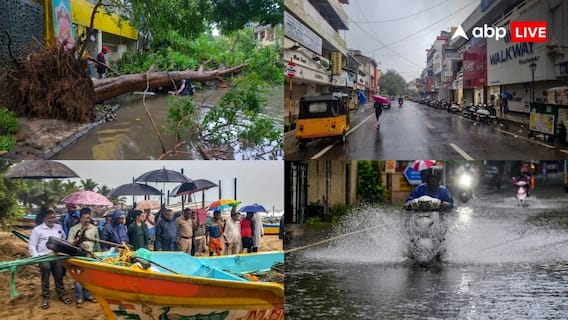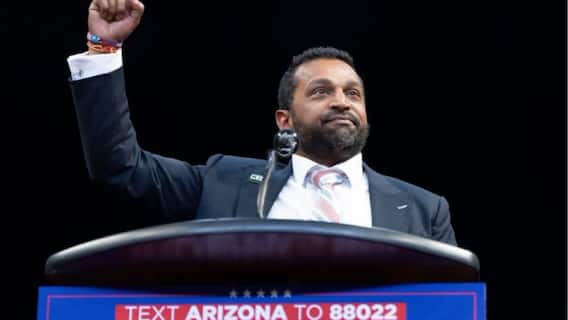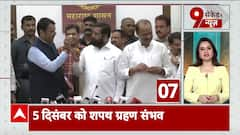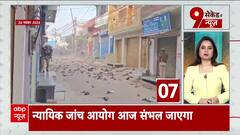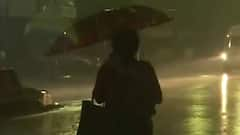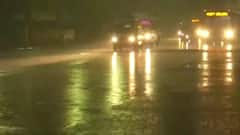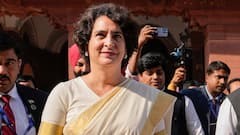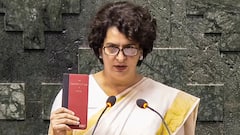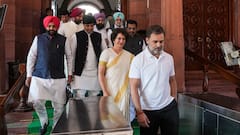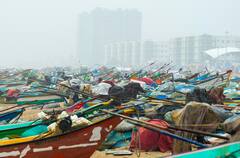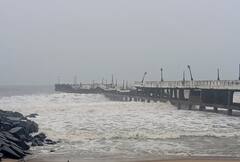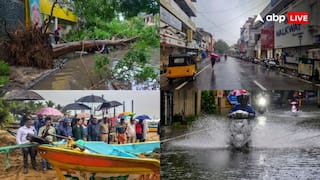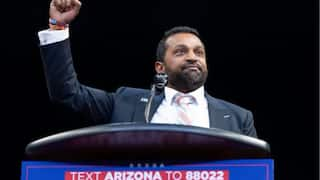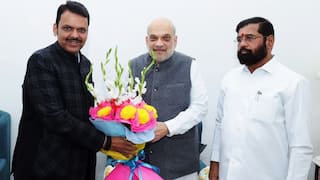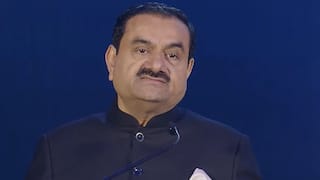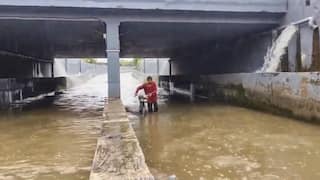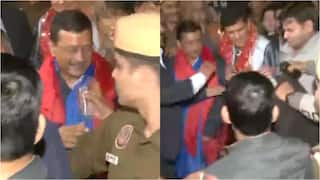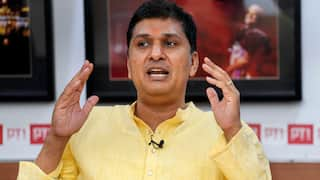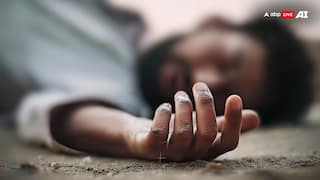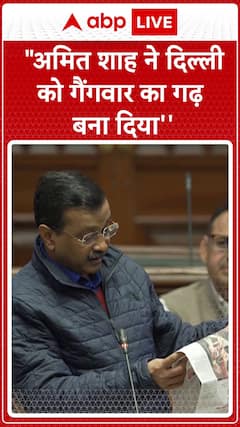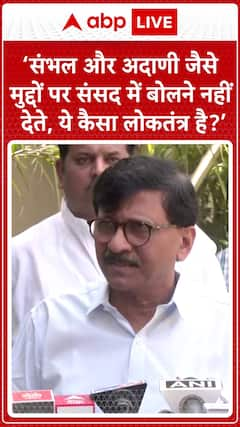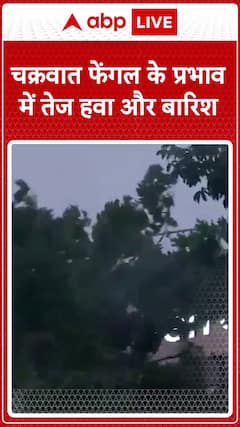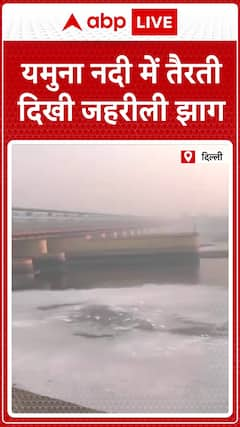Explorer
Advertisement
Kisan Kranti Yatra: Farmers' Protest From Haridwar To Delhi Explained In 10 Points
Kisan Kranti Yatra, a protest rally organised by the Bharatiya Kisan Union commenced on September 23 from Haridwar, Uttarakhand and was scheduled to reach the Kisan Ghat in the national capital on Tuesday, October 2. The protest was led by Bharatiya Kisan Union chief Rakesh Tikait, who is the son of BKU founder Mahendra Singh Tikait

Police use water cannons to disperse farmers protesting at Delhi-UP border during Kisan Kranti Padyatra in New Delhi on Tuesday. PTI Photo
NEW DELHI: Kisan Kranti Yatra, a protest rally organised by the Bharatiya Kisan Union commenced on September 23 from Haridwar, Uttarakhand and was scheduled to reach Kisan Ghat in the national capital on Tuesday, October 2. The protest was led by Bharatiya Kisan Union chief Rakesh Tikait, who is the son of BKU founder Mahendra Singh Tikait. Farmers marched towards Delhi demanding unconditional loan waiver for farmers, clearing of dues by sugar mills, higher prices for crops, free electricity for farms and a cut in diesel prices.
2: As it passed through major cities, the agitation was joined by farmers from various parts of Uttar Pradesh and Uttarakhand. Traffic jam was witnessed on the National Highway 58 on Sunday and Monday and people travelling from Delhi to Haridwar and Dehradun faced difficulties due to diversion of route.
3: On Monday, the Delhi police imposed prohibitory orders in east and northeast Delhi anticipating law and order problems as the march, organised from Haridwar via Muzaffarnagar, Daurala, Partapur, Modi Nagar, Muradnagar, Hindon Ghat, reached close to the national capital. The protesters proceeded towards Delhi with hundreds of tractor-trolleys and private vehicles.
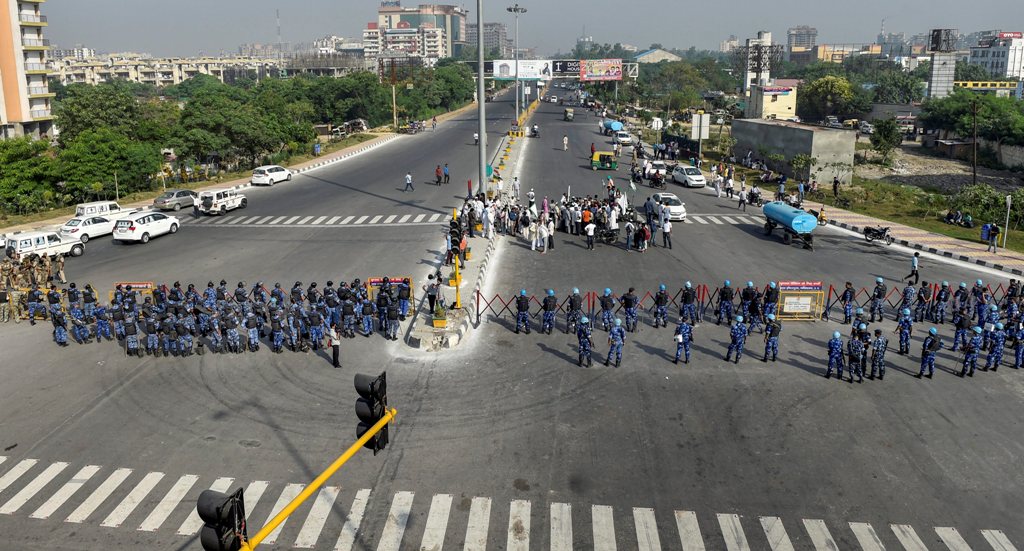 Heavy security deployed at Delhi-UP border. PTI Photo
4: On Tuesday, when protesting farmers attempted to enter the national capital, the police resort to water cannons and tear-gas shells to disperse them. They clashed with police at the Delhi-Uttar Pradesh border when they were prevented from marching towards their destination and lathi-charged and tear-gassed after water canons failed to subdue them.
5: When protesters tried to forcibly move ahead by breaking police barricades, police used water canons and batons that left over a dozen agitators injured. Delhi Police said seven policemen, including an assistant commissioner, were also injured as protesting farmers turned violent. As many as 3,000 police personnel were deployed at the Delhi-UP border.
Heavy security deployed at Delhi-UP border. PTI Photo
4: On Tuesday, when protesting farmers attempted to enter the national capital, the police resort to water cannons and tear-gas shells to disperse them. They clashed with police at the Delhi-Uttar Pradesh border when they were prevented from marching towards their destination and lathi-charged and tear-gassed after water canons failed to subdue them.
5: When protesters tried to forcibly move ahead by breaking police barricades, police used water canons and batons that left over a dozen agitators injured. Delhi Police said seven policemen, including an assistant commissioner, were also injured as protesting farmers turned violent. As many as 3,000 police personnel were deployed at the Delhi-UP border.
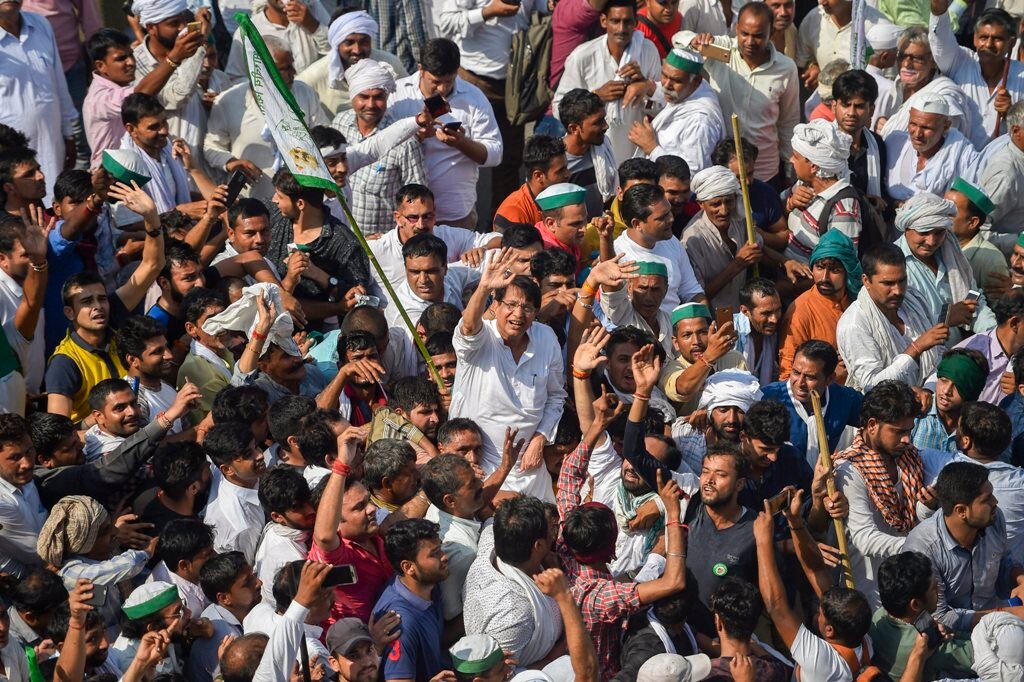 RLD chief Ajit Singh and farmers protesting at Delhi-UP border. PTI Photo
6: The Police action on the protesting farmers led to a political slugfest, with the opposition slamming the Modi government for not allowing the Kisan Kranti Padyatra to enter Delhi. Congress President Rahul Gandhi criticised the government for what he called the brutal beating of peaceful farmers and said that "now, farmers cannot even come to the country's capital and talk about their ordeal".
7: Under pressure from the Opposition and after facing flak for police action against farmers, the Centre called for a meeting between Home Minister Rajnath Singh and representatives of the BKU. In the meeting, the charter of 15 demands that included loan waiver and higher Minimum Support Price was discussed. Soon reports surfaced that the government had agreed to seven of their demands.
RLD chief Ajit Singh and farmers protesting at Delhi-UP border. PTI Photo
6: The Police action on the protesting farmers led to a political slugfest, with the opposition slamming the Modi government for not allowing the Kisan Kranti Padyatra to enter Delhi. Congress President Rahul Gandhi criticised the government for what he called the brutal beating of peaceful farmers and said that "now, farmers cannot even come to the country's capital and talk about their ordeal".
7: Under pressure from the Opposition and after facing flak for police action against farmers, the Centre called for a meeting between Home Minister Rajnath Singh and representatives of the BKU. In the meeting, the charter of 15 demands that included loan waiver and higher Minimum Support Price was discussed. Soon reports surfaced that the government had agreed to seven of their demands.
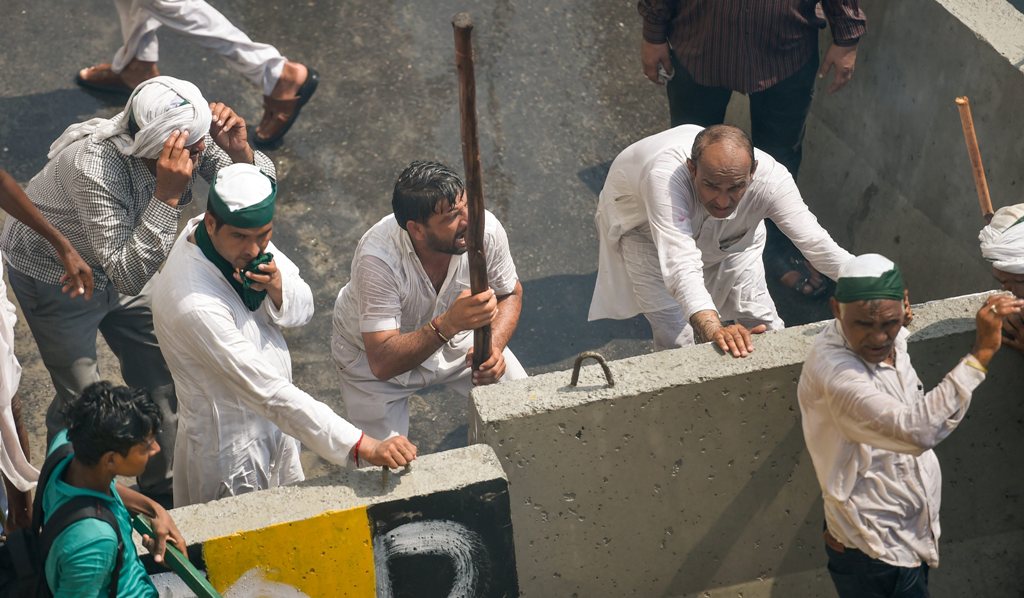 Farmers trying to break through a police barricade. PTI Photo
8: The government said a review petition will be filed against the National Green Tribunal's order to ban diesel vehicles that are over 10 years old and several other measures will be taken to address their concerns. The Centre also assured farmers that it would fix the MSP of rabi (winter-sown) crops like wheat at least 1.5 times of the production cost. It would also try to restrict imports of agri items that are produced abundantly in the country.
9: Union Minister of State for Agriculture Gajendra Singh Shekhawat was rushed to meet the protesting farmers at the Delhi-UP border. Shekhawat said a committee of chief ministers will also look into the farmers' demand, as he sought to assure the protesters that the government will take forward their cause.
Farmers trying to break through a police barricade. PTI Photo
8: The government said a review petition will be filed against the National Green Tribunal's order to ban diesel vehicles that are over 10 years old and several other measures will be taken to address their concerns. The Centre also assured farmers that it would fix the MSP of rabi (winter-sown) crops like wheat at least 1.5 times of the production cost. It would also try to restrict imports of agri items that are produced abundantly in the country.
9: Union Minister of State for Agriculture Gajendra Singh Shekhawat was rushed to meet the protesting farmers at the Delhi-UP border. Shekhawat said a committee of chief ministers will also look into the farmers' demand, as he sought to assure the protesters that the government will take forward their cause.
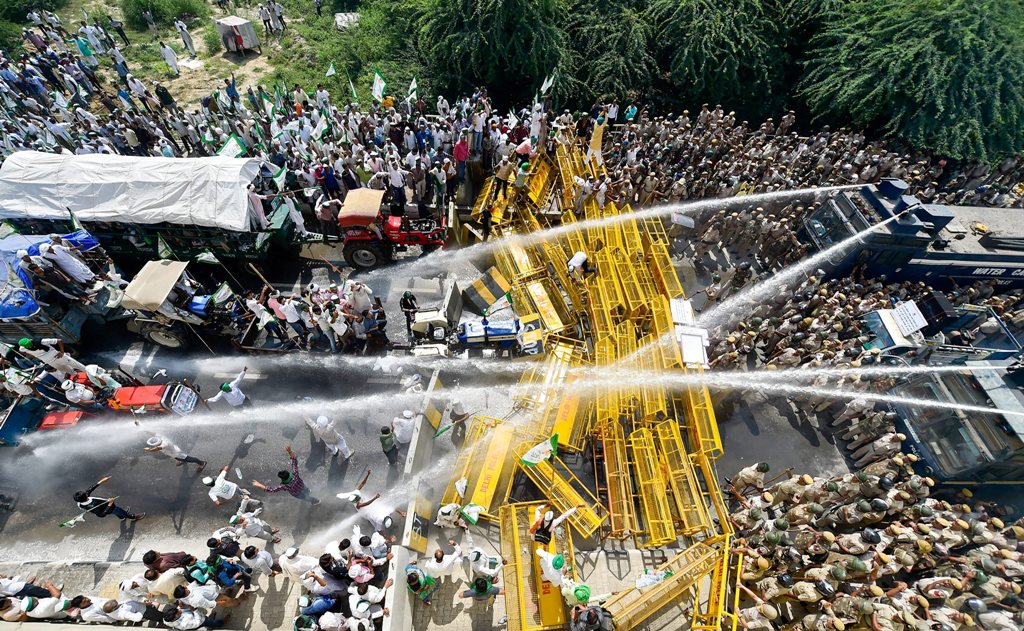 Police using water canons to disperse protesters. PTI Photo
10: Later in the evening, BKU chief Naresh Tikait said the farmers are "not satisfied" with the government's assurance and the protest will continue at the Delhi-UP border. The government has given assurances on some demands, Tikait said. "But, our main demands of electricity, sugarcane recommendations of Swaminathan report remain as it is. These were among the main demands of the farmers," Tikait said. On the next step, he said, "We are sitting here as of now and this only is our next step." The protesters, many of whom said they have come from as far as Haridwar over 200 kms away, appeared ready to stay put at the border with hundreds of tractors and trolleys with food, water, mattresses and even generators parked alongside the roads for over a kilometre of distance.
(With inputs from agencies)
Police using water canons to disperse protesters. PTI Photo
10: Later in the evening, BKU chief Naresh Tikait said the farmers are "not satisfied" with the government's assurance and the protest will continue at the Delhi-UP border. The government has given assurances on some demands, Tikait said. "But, our main demands of electricity, sugarcane recommendations of Swaminathan report remain as it is. These were among the main demands of the farmers," Tikait said. On the next step, he said, "We are sitting here as of now and this only is our next step." The protesters, many of whom said they have come from as far as Haridwar over 200 kms away, appeared ready to stay put at the border with hundreds of tractors and trolleys with food, water, mattresses and even generators parked alongside the roads for over a kilometre of distance.
(With inputs from agencies)
 Heavy security deployed at Delhi-UP border. PTI Photo
4: On Tuesday, when protesting farmers attempted to enter the national capital, the police resort to water cannons and tear-gas shells to disperse them. They clashed with police at the Delhi-Uttar Pradesh border when they were prevented from marching towards their destination and lathi-charged and tear-gassed after water canons failed to subdue them.
5: When protesters tried to forcibly move ahead by breaking police barricades, police used water canons and batons that left over a dozen agitators injured. Delhi Police said seven policemen, including an assistant commissioner, were also injured as protesting farmers turned violent. As many as 3,000 police personnel were deployed at the Delhi-UP border.
Heavy security deployed at Delhi-UP border. PTI Photo
4: On Tuesday, when protesting farmers attempted to enter the national capital, the police resort to water cannons and tear-gas shells to disperse them. They clashed with police at the Delhi-Uttar Pradesh border when they were prevented from marching towards their destination and lathi-charged and tear-gassed after water canons failed to subdue them.
5: When protesters tried to forcibly move ahead by breaking police barricades, police used water canons and batons that left over a dozen agitators injured. Delhi Police said seven policemen, including an assistant commissioner, were also injured as protesting farmers turned violent. As many as 3,000 police personnel were deployed at the Delhi-UP border.
 RLD chief Ajit Singh and farmers protesting at Delhi-UP border. PTI Photo
6: The Police action on the protesting farmers led to a political slugfest, with the opposition slamming the Modi government for not allowing the Kisan Kranti Padyatra to enter Delhi. Congress President Rahul Gandhi criticised the government for what he called the brutal beating of peaceful farmers and said that "now, farmers cannot even come to the country's capital and talk about their ordeal".
7: Under pressure from the Opposition and after facing flak for police action against farmers, the Centre called for a meeting between Home Minister Rajnath Singh and representatives of the BKU. In the meeting, the charter of 15 demands that included loan waiver and higher Minimum Support Price was discussed. Soon reports surfaced that the government had agreed to seven of their demands.
RLD chief Ajit Singh and farmers protesting at Delhi-UP border. PTI Photo
6: The Police action on the protesting farmers led to a political slugfest, with the opposition slamming the Modi government for not allowing the Kisan Kranti Padyatra to enter Delhi. Congress President Rahul Gandhi criticised the government for what he called the brutal beating of peaceful farmers and said that "now, farmers cannot even come to the country's capital and talk about their ordeal".
7: Under pressure from the Opposition and after facing flak for police action against farmers, the Centre called for a meeting between Home Minister Rajnath Singh and representatives of the BKU. In the meeting, the charter of 15 demands that included loan waiver and higher Minimum Support Price was discussed. Soon reports surfaced that the government had agreed to seven of their demands.
 Farmers trying to break through a police barricade. PTI Photo
8: The government said a review petition will be filed against the National Green Tribunal's order to ban diesel vehicles that are over 10 years old and several other measures will be taken to address their concerns. The Centre also assured farmers that it would fix the MSP of rabi (winter-sown) crops like wheat at least 1.5 times of the production cost. It would also try to restrict imports of agri items that are produced abundantly in the country.
9: Union Minister of State for Agriculture Gajendra Singh Shekhawat was rushed to meet the protesting farmers at the Delhi-UP border. Shekhawat said a committee of chief ministers will also look into the farmers' demand, as he sought to assure the protesters that the government will take forward their cause.
Farmers trying to break through a police barricade. PTI Photo
8: The government said a review petition will be filed against the National Green Tribunal's order to ban diesel vehicles that are over 10 years old and several other measures will be taken to address their concerns. The Centre also assured farmers that it would fix the MSP of rabi (winter-sown) crops like wheat at least 1.5 times of the production cost. It would also try to restrict imports of agri items that are produced abundantly in the country.
9: Union Minister of State for Agriculture Gajendra Singh Shekhawat was rushed to meet the protesting farmers at the Delhi-UP border. Shekhawat said a committee of chief ministers will also look into the farmers' demand, as he sought to assure the protesters that the government will take forward their cause.
 Police using water canons to disperse protesters. PTI Photo
10: Later in the evening, BKU chief Naresh Tikait said the farmers are "not satisfied" with the government's assurance and the protest will continue at the Delhi-UP border. The government has given assurances on some demands, Tikait said. "But, our main demands of electricity, sugarcane recommendations of Swaminathan report remain as it is. These were among the main demands of the farmers," Tikait said. On the next step, he said, "We are sitting here as of now and this only is our next step." The protesters, many of whom said they have come from as far as Haridwar over 200 kms away, appeared ready to stay put at the border with hundreds of tractors and trolleys with food, water, mattresses and even generators parked alongside the roads for over a kilometre of distance.
(With inputs from agencies)
Police using water canons to disperse protesters. PTI Photo
10: Later in the evening, BKU chief Naresh Tikait said the farmers are "not satisfied" with the government's assurance and the protest will continue at the Delhi-UP border. The government has given assurances on some demands, Tikait said. "But, our main demands of electricity, sugarcane recommendations of Swaminathan report remain as it is. These were among the main demands of the farmers," Tikait said. On the next step, he said, "We are sitting here as of now and this only is our next step." The protesters, many of whom said they have come from as far as Haridwar over 200 kms away, appeared ready to stay put at the border with hundreds of tractors and trolleys with food, water, mattresses and even generators parked alongside the roads for over a kilometre of distance.
(With inputs from agencies)
Follow Breaking News on ABP Live for more latest stories and trending topics. Watch breaking news and top headlines online on ABP News LIVE TV
View More
Advertisement
Trending News
Advertisement
Advertisement
Top Headlines
India
World
India
Business
Advertisement


Sagarneel SinhaSagarneel Sinha
Opinion




